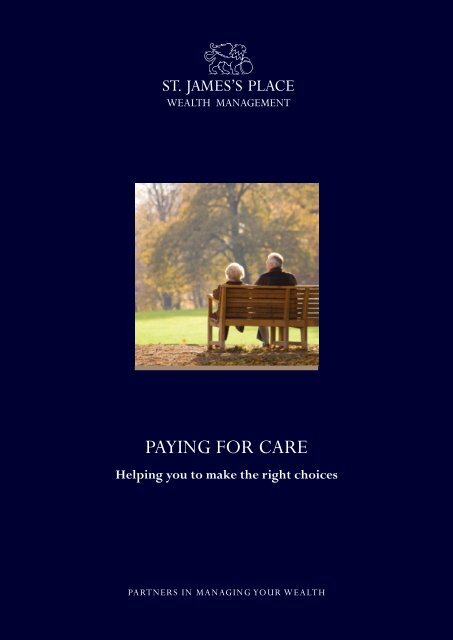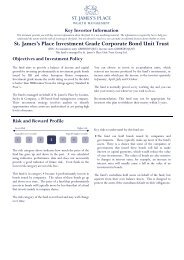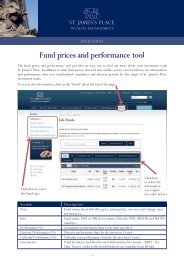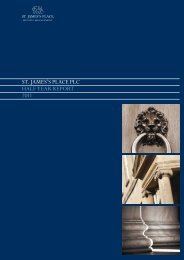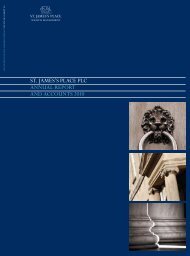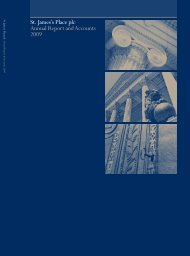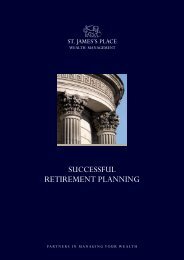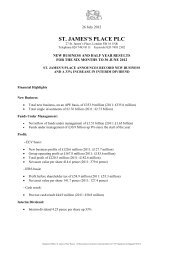PAYING FOR CARE - St James's Place
PAYING FOR CARE - St James's Place
PAYING FOR CARE - St James's Place
You also want an ePaper? Increase the reach of your titles
YUMPU automatically turns print PDFs into web optimized ePapers that Google loves.
<strong>PAYING</strong> <strong>FOR</strong> <strong>CARE</strong><br />
Helping you to make the right choices<br />
PARTNERS IN MANAGING YOUR WEALTH<br />
1
Few of us will make major financial decisions without consulting an<br />
experienced and professionally qualified adviser. For example, when<br />
arranging a mortgage or planning for retirement most of us will have taken<br />
the advice of an expert.<br />
It’s amazing to consider that when it comes to paying for care there is so<br />
little help and advice available; and yet for many families this will be one of<br />
the most expensive commitments they make.<br />
At <strong>St</strong>. James’s <strong>Place</strong> our Partners are selected for their professionalism,<br />
knowledge and experience in advising families about their choices when it<br />
comes to paying for care. This guide can help you to understand a little more<br />
about paying for care, but it cannot replace the advice of our Partners.<br />
2
Introduction<br />
Entering care or choosing care for an elderly relative is not something most<br />
of us have very much experience in; indeed for most of us it is something<br />
we will only do once. Your thoughts will inevitably be to make certain that<br />
the right care is provided in the best setting, but you will also be aware that<br />
the cost of care is an important factor.<br />
Over the years care fees can quickly mount up and often this can have a<br />
depleting effect on available funds. It would not be the choice of most<br />
families for an individual’s entire wealth to be spent on care fees, if this<br />
could be avoided. Indeed, the worst time to find out that you had choices<br />
about paying for care is when the money has run out!<br />
Choosing a care home<br />
There are many factors to take into account when choosing the right<br />
setting for care. A search on the Care Quality Commission website will<br />
quickly reveal that there is often a bewildering choice of care homes in a<br />
small radius of where you live.<br />
If you need help in understanding the different care providers and what<br />
they have to offer, we can introduce you to an organisation who can help.<br />
They are experts in helping families find the right care. They will gain an<br />
understanding of your care needs and personal preferences and help you to<br />
narrow your search accordingly.<br />
Types of care<br />
There are two types of residential care homes, those with and those without<br />
nursing. Care homes are suitable for those who need help with daily tasks,<br />
and nursing homes are for those who also require medical attention.<br />
For those with less acute needs, it may be possible to receive care at home.<br />
This is known as ‘domiciliary care’.<br />
3
Care assessments<br />
An assessment of the individual’s care needs will be carried out to determine<br />
the level of care required. If medical care is needed an assessment as to<br />
whether you qualify for full funding by the NHS or for a contribution to<br />
the nursing care costs.<br />
Having assessed the medical needs, a financial assessment will be carried<br />
out to determine whether there is an entitlement to have your care partly<br />
or fully funded by the local authority. A care package will then be drawn<br />
up, recommending the most appropriate form of care and who will be<br />
responsible for meeting the cost of the care required.
Who pays for care?<br />
The financial assessment carried out by the local authority will determine<br />
who is responsible for paying for care. A questionnaire will need to be<br />
completed, detailing all of the capital and income available to you.<br />
It is important that you take advice so that you know that the financial<br />
assessment has been completed correctly.<br />
When assessing how much capital you have, certain assets are ignored. In<br />
particular, the value of your home is ignored if:<br />
• Your spouse still lives in the property<br />
• A relative over 60 resides there<br />
• A disabled relative lives there<br />
• A child under 18 lives there<br />
• You are in the first twelve weeks of needing permanent care (please see<br />
the twelve-week property disregard section later)<br />
• Care is being provided on a temporary basis.<br />
When considering the cost of care, it is important to note that the cost<br />
is normally expressed as an all-inclusive cost. Although it may sound<br />
expensive, it will include all food and drinks and bills like gas and electricity.<br />
So when you deduct the costs of daily living from the cost of care, you<br />
will have a clearer picture of the net cost. Once you deduct from this any<br />
pension or other regular income, including certain state benefits, you will<br />
then see whether there is enough regular income to meet the cost of care,<br />
or whether there is a shortfall to be funded.<br />
5
<strong>St</strong>ate benefits and financial assistance<br />
There are currently (2010/11) several state benefits and other sources of<br />
financial assistance that may be available to you.<br />
Attendance Allowance<br />
This is payable when the individual has a disability, which means that they<br />
require help caring for themselves. It is not means tested and is tax free. It<br />
is payable at two rates: the lower rate is £47.80 per week and the higher is<br />
£71.40 per week; this depends on the level of disability. This continues to<br />
be paid even if the recipient enters a care home. It is important that this is<br />
claimed and regularly assessed.<br />
Twelve-week property disregard<br />
Where there is a property and other assets of less than £23,250 (in England<br />
and Northern Ireland with different limits applying in Scotland and Wales)<br />
its value should be ignored for the first twelve weeks of entering care. The<br />
individual will, however, be expected to give up all of their income, less a<br />
personal expense allowance of £22.30 per week (in England and Northern<br />
Ireland – again, different allowances apply in Scotland and Wales) to pay<br />
towards the cost of care. If their income exceeds the local authority rate,<br />
they will receive no assistance. Also, if the care home rate exceeds the local<br />
authority contribution, they may be expected to make up the difference<br />
during the twelve weeks.<br />
Once the twelve weeks is over they will be expected to meet all the<br />
care costs less benefits.<br />
Deferred Payment Scheme<br />
Once the twelve-week property disregard period is over, the local authority<br />
may offer their Deferred Payment Scheme, whereby they will provide an<br />
interest-free loan to meet the care fees until a house is sold or resident dies<br />
if sooner. The local authority does not have to agree, but if it does, then it<br />
would place a charge on the property for the amount of the loan.<br />
The local authority is not allowed to charge interest on the loan during<br />
the resident’s lifetime, which does make the option worth considering.<br />
It can, however, result in a significant debt against the property over the<br />
longer term.<br />
6
Registered Nursing Care Contribution (RNCC)<br />
If you are entering a care home with nursing provision, you may be eligible<br />
for RNCC, which is a contribution towards the cost of providing nursing<br />
care. The RNCC is paid directly to the care home. It is important to check<br />
whether the cost quoted to you includes the RNCC contribution or not.<br />
Depending on the level of need, it is also possible that you may qualify for<br />
NHS fully funded care. This is decided by the local primary care trust and<br />
can be assessed at the same time as RNCC.<br />
Cost of care<br />
Laing & Buisson, the leading provider of market intelligence in the care<br />
sector, has researched the cost of residential and nursing home fees across<br />
the UK. The survey was conducted between April and June 2009 and was<br />
based upon over 2,100 of the 14,000 registered private and voluntary care<br />
homes for older people in the UK.<br />
The costs of care outlined below are based on forecasts relating to the<br />
period from 1 April 2009 to 21 March 2010.<br />
Region<br />
Average Nursing Care Fees<br />
£ per week<br />
England 715<br />
Northern Ireland 554<br />
Wales 611<br />
Scotland 614<br />
Region<br />
Average Residential Care Fees<br />
£ per week<br />
England 495<br />
Northern Ireland 453<br />
Wales 422<br />
Scotland 531<br />
7
Paying for care<br />
Using capital to meet care fees<br />
One option for meeting care fees is to place a lump sum on deposit and<br />
withdraw funds to meet the care fees. While this is a viable option for some,<br />
the main disadvantage is that, over time, the funds may become exhausted<br />
in meeting the fees.<br />
Once the capital has reduced to £23,250 (in England and Northern Ireland),<br />
the local authority will then undertake an assessment to possibly provide<br />
some financial assistance, but this will only be at the local authority rate.<br />
Furthermore, the resident will be expected to give up all but a small amount<br />
of income to meet these fees and if the income exceeds the local authority rate,<br />
there will be no financial assistance. Also, some care homes may no longer be<br />
prepared to keep the resident in their home if only the local authority rate is<br />
being paid, meaning that they may have to move to another home (perhaps<br />
to one run by the local authority). This can be a very distressing experience<br />
and it is sensible when choosing a home to ask what the home’s policy is if the<br />
money runs out and the home only receives the local authority rate.
Care fees plans<br />
These are a specific type of investment, designed to meet the costs of care<br />
where an income is provided in exchange for a lump sum. However, unlike<br />
other types of annuities, the returns are based on the age and health of<br />
the annuitant and they have many features and advantages specific to the<br />
care market.<br />
The main benefit of buying a care fees plan is that it will provide a guaranteed<br />
income for life, irrespective of how long you live. This means that even if you<br />
live longer than expected the income will continue; and you will therefore<br />
have set a limit on the amount you will have to spend on care fees. On the<br />
other hand, if you die earlier than expected then you will lose some of the<br />
money you have paid for the care fees plan.<br />
Many families are prepared to take the risk of a care fees plan because it<br />
gives long-term financial certainty and peace of mind. For a given lump sum<br />
investment you can protect the rest of the estate from the impact of care fees.<br />
For some families the risk of early death is more than offset by the advantage<br />
of financial certainty and peace of mind. It is a choice only you can make.<br />
There are other features and benefits of a care fees plan:<br />
Capital protection: This allows you to protect part of the cost of the<br />
care fees plan in the event of death in the early years. If, for example,<br />
50% capital protection is selected, then upon death 50% of the cost of<br />
the care fees plan will be paid to the estate, less the total monthly care<br />
fees already paid; if these payments exceed 50% then nothing is paid.<br />
Tax free income: Where the care fees plan is paid directly to the care<br />
provider, it is paid tax free.<br />
Indexation: You can choose to increase the level of a care fees plan<br />
each year by a set percentage, or in line with an index such as the Retail<br />
Prices Index. Some care providers may agree to cap the annual fees<br />
increase to the level of indexation you have built in to the care fees<br />
plan. It is worth discussing this possibility with the care provider before<br />
buying the care fees plan.<br />
9
Bed guarantee: Payments will continue to be made to the care<br />
provider in the event of entering hospital for treatment. This guarantees<br />
the care place in this situation.<br />
Deferred option: This reduces the cost of the care fees plan, as the<br />
income only commences after a deferred period, usually between one<br />
and five years.<br />
Flexible payment frequencies: This allows you to choose how often<br />
the income is paid and is often designed to fit in with the care provider’s<br />
requirements: for example, monthly, every 4 weeks or quarterly.<br />
Inheritance tax advantage: If the estate will be subject to<br />
inheritance tax, the amount of the investment required to buy the care<br />
fees plan is in effect reduced by the 40% tax, which would have been<br />
due, provided capital protection has not been selected.<br />
Investment bond<br />
An alternative to buying a care fees plan is the option to invest a lump sum<br />
to generate an income to meet the care fees. Investment bonds can be used<br />
for this purpose as they provide an easy-to-understand product with the<br />
ability to take regular tax-deferred withdrawals of up to 5% of the amount<br />
invested for up to 20 years. These withdrawals will be taxed when the<br />
bond is eventually brought to an end, but they provide an income during<br />
the 20 years without any immediate tax liability.<br />
As with all investments used to fund income, there is always the risk that<br />
the funds will be exhausted, especially if the level of income taken exceeds<br />
the growth in the investments. In addition, there is the risk that care costs<br />
could exceed 5% of the investment amount. This could result in you having<br />
to make up the difference from other resources, or that larger withdrawals<br />
need to be taken from the investment bond, which may be taxed.<br />
Unit trusts<br />
As an alternative to an investment bond, you may wish to consider<br />
unit trusts instead. Unit trusts have a wide range of funds available for<br />
investment and also have the benefit of paying income, with no additional<br />
liability to income tax for basic rate tax payers.<br />
10
Combination<br />
An alternative approach might be to combine two or more of the options<br />
listed above. A care fees plan could be purchased with a three-year deferred<br />
period, and the first three years’ care fees could be paid from capital.<br />
Another option would be to consider using a care fees plan for some of the<br />
fees and pay the balance from capital.<br />
Whatever method you choose, you should be presented with all the facts<br />
and choices in order that you can decide the right one for you. It is also<br />
important to understand the care provider’s attitude if the funds run out<br />
and the fees become payable by the local authority. Will they insist that the<br />
family makes up the difference? Will they accept the local authority rate or<br />
will they ask you to leave?<br />
Inheritance tax planning<br />
What to do with property<br />
If you have a property to sell in order to meet the cost of care, there are a<br />
few things to think about.<br />
Firstly, renting the property out might be a better option than selling it.<br />
The rental income could contribute to the care costs. One of the problems<br />
with rental income is that it is not guaranteed and once tax, management<br />
fees and repairs are factored in, the net return could be insufficient to meet<br />
the shortfall in care fees.<br />
You should also be aware that some buildings and contents insurance<br />
policies become invalid if a property is empty for a certain period, often<br />
31 days. Also, if the property is empty during the winter, you may need to<br />
take action to prevent the pipes freezing, such as draining the water system<br />
or leaving the heating on a very low setting.<br />
11
If you do wish to sell the property, we have links with two specialist<br />
property management and funding companies who can help. They can<br />
assist you with all matters associated with property sale and management<br />
and can also provide funds over the short term to help meet care costs until<br />
the property is sold.<br />
If you are unsure whether you want to sell the property immediately, we<br />
can arrange a loan secured on your property, which would enable you to<br />
purchase a care fees plan. The loan and interest due on the loan are repaid<br />
on death or earlier sale of the property.<br />
We can help you make the right choices in relation to property.
Other matters<br />
Looking after the financial affairs of another person<br />
If the management of the financial affairs of an individual requiring care is<br />
best given over to another person, then provided the individual is able to<br />
give his or her consent, the most effective way of achieving this is through<br />
a Lasting Powers of Attorney (known in Scotland as a Continuing Power<br />
of Attorney). This document allows the legal power to act on behalf of<br />
someone who is mentally or physically incapacitated. There are two types<br />
of Lasting Powers of Attorney: Property and Affairs and Personal Welfare.<br />
All Lasting Powers of Attorney must be registered with the Office of the<br />
Public Guardian before they can be used.<br />
Arranging a Lasting Power of Attorney is the only way to ensure that the<br />
individual’s affairs will be looked after by the people they would wish, when<br />
they are no longer able to do so. If no Lasting Power of Attorney is in place<br />
before they become mentally incapacitated, an application would need to<br />
be made to the Court of Protection for the appointment of a deputy to<br />
act on their behalf. This could be both time-consuming and expensive and<br />
their powers may be more limited than under a Lasting Power of Attorney.<br />
Making a Will *<br />
It is sensible to have a Will and to make sure that it is up to date and reflects<br />
your current circumstances and wishes. It is extremely unlikely that the<br />
laws of intestacy will distribute your estate in the way you would wish and<br />
dying without a will imposes burdens on the family which can be avoided.<br />
* Wills are not regulated by the Financial Services Authority. The writing of a Will<br />
involves a service that is separate and distinct to those offered by <strong>St</strong>. James’s <strong>Place</strong>.<br />
13
Case study<br />
Mr Dean contacted us after his 89-year-old mother was about to move<br />
into a care home. She was about to be discharged from hospital following<br />
a stroke and a fall and Mr Dean felt that she was too frail to live alone now.<br />
Mr Dean helped us to establish the following facts:<br />
Mrs Dean’s savings (mostly the proceeds from the sale of her house)<br />
totalled £270,000.<br />
She had a total net annual income of £14,124.<br />
The care home fees were £675 per week (£35,100 per annum).<br />
This left Mrs Dean with a shortfall of £20,296 – the amount between her<br />
income and fees.<br />
After assessing the facts and researching the options available Mr Dean<br />
decided to purchase a care fees plan at a cost of £89,000.<br />
While this is not refundable, the care fees plan guaranteed to pay Mrs Dean’s<br />
care fees every year for the rest of her life. The family was aware that they<br />
were in effect taking a financial gamble, but what was important to them was<br />
the financial certainty and peace of mind that the care fees plan gave them.<br />
The family also asked for our advice regarding investing the remaining<br />
£181,000.<br />
14
What you can expect from<br />
<strong>St</strong>. James’s <strong>Place</strong><br />
We will:<br />
• Explain the care system and help you understand more about paying<br />
for care<br />
• Explain the benefits system and help you to claim the right benefits<br />
• Advise you on the responsibilities of an Attorney<br />
• Verify that the local authority has carried out the correct<br />
financial assessment<br />
• Advise on the twelve-week property disregard<br />
• Advise in relation to nursing care and what to do if you feel that the NHS<br />
should be paying for your care<br />
• Advise in relation to the care contract, in particular helping you to<br />
understand what will happen should the money run out and also the<br />
implications of increases in care costs<br />
• Advise on options for paying for care including:<br />
oo<br />
oo<br />
oo<br />
oo<br />
Paying directly from capital<br />
Investing capital<br />
Care fees plans<br />
A combination of the above<br />
• Help you to increase your income net of tax<br />
• Protect age allowance (saving nearly £700 each year in tax)<br />
• Simplify administration of the estate (avoiding the need to complete a<br />
tax return each year, saving costs and keeping management simple)<br />
• Provide investment advice<br />
• Advise on inheritance tax planning.<br />
Some of the above may involve services that are separate and distinct to those offered<br />
by <strong>St</strong>. James’s <strong>Place</strong>.
Members of the <strong>St</strong>. James’s <strong>Place</strong> Wealth Management Group are authorised and regulated by the Financial Services Authority. The<br />
<strong>St</strong>. James’s <strong>Place</strong> Partnership and the title ‘Partner’ are the Marketing terms used to describe <strong>St</strong>. James’s <strong>Place</strong> representatives.<br />
<strong>St</strong>. James’s <strong>Place</strong> Wealth Management Group plc: Registered Office: <strong>St</strong>. James’s <strong>Place</strong> House, 1 Tetbury Road, Cirencester, Gloucestershire, GL7 1FP, United Kingdom<br />
Registered in England Number 2627518<br />
SJ 323<br />
SJP3393-VR1 (10/10)


